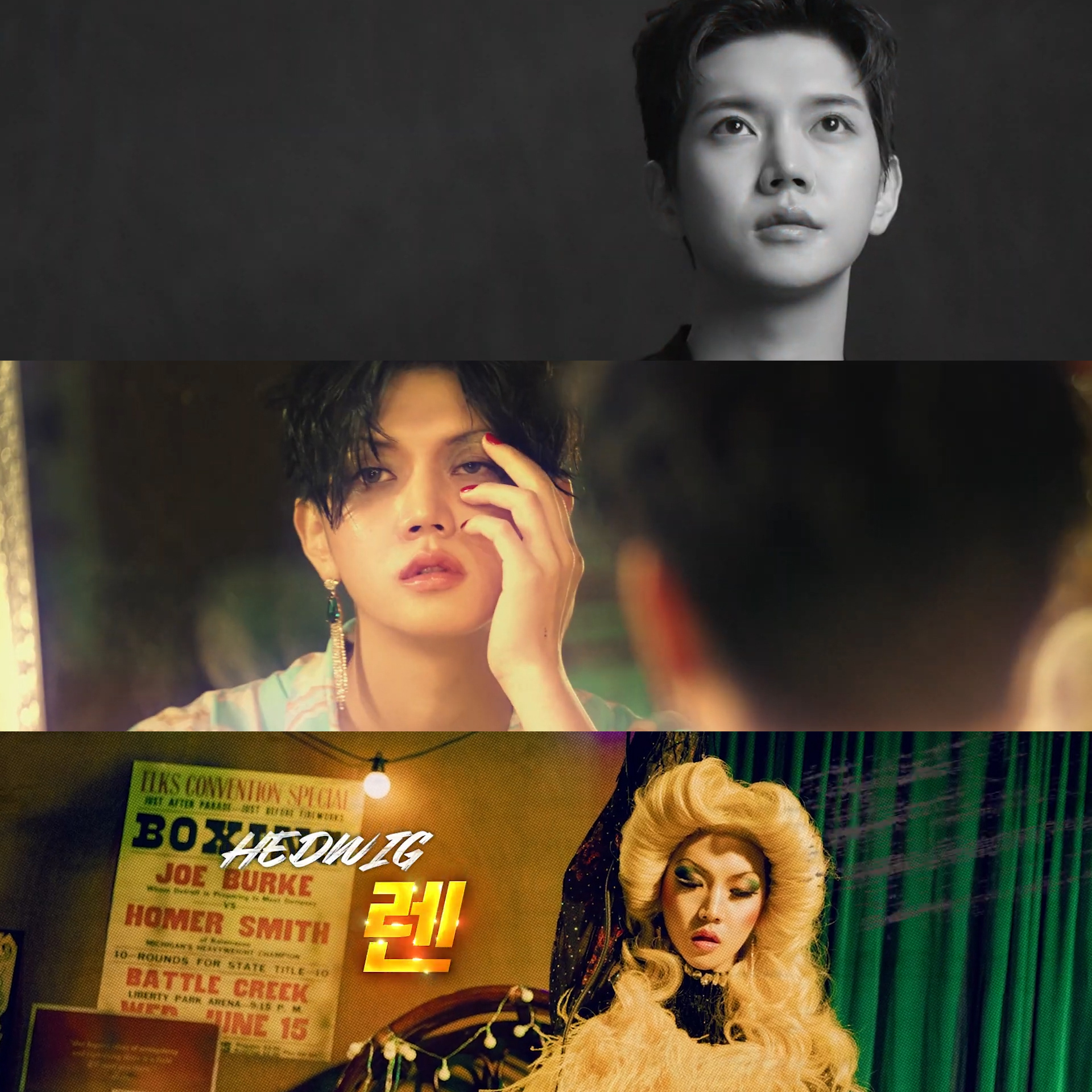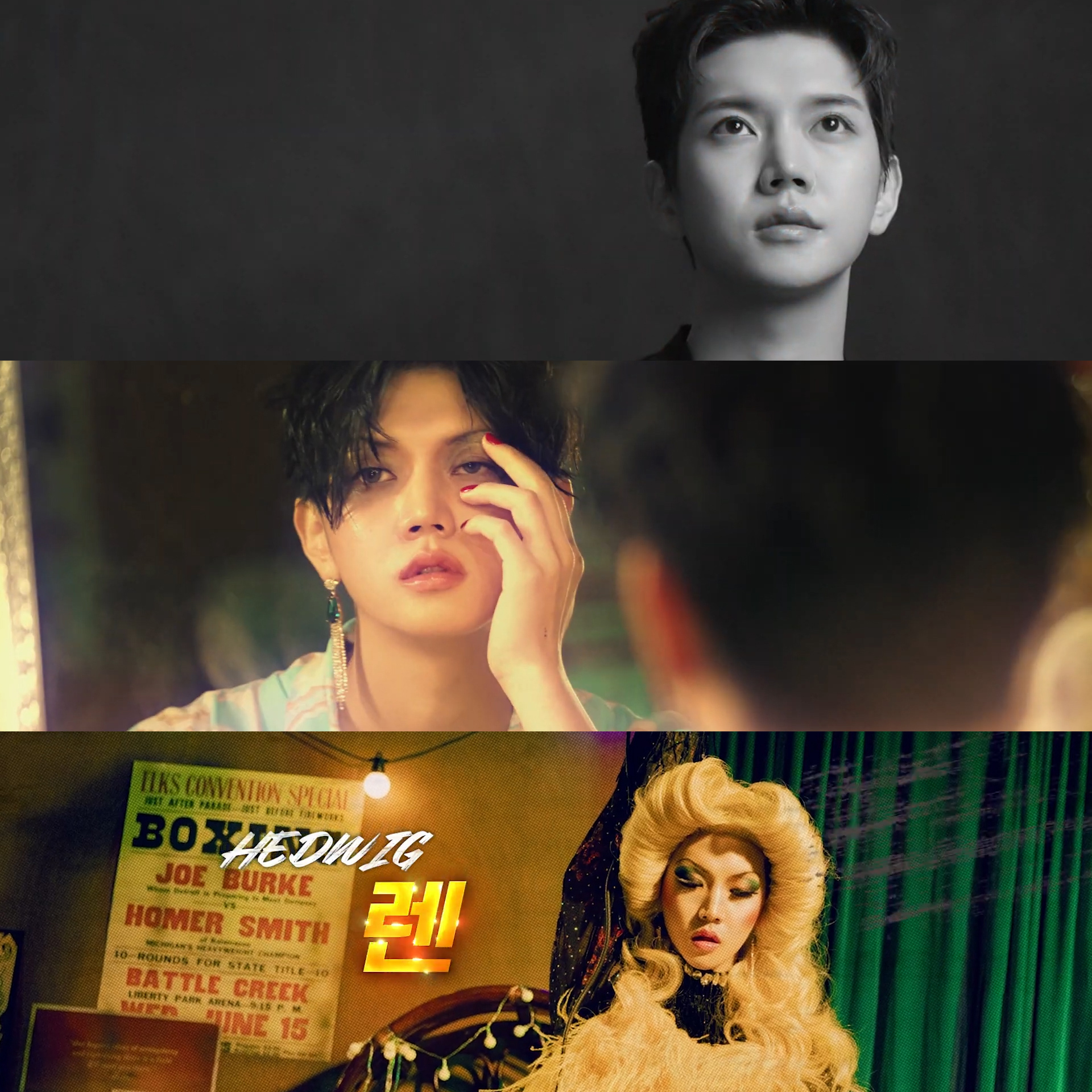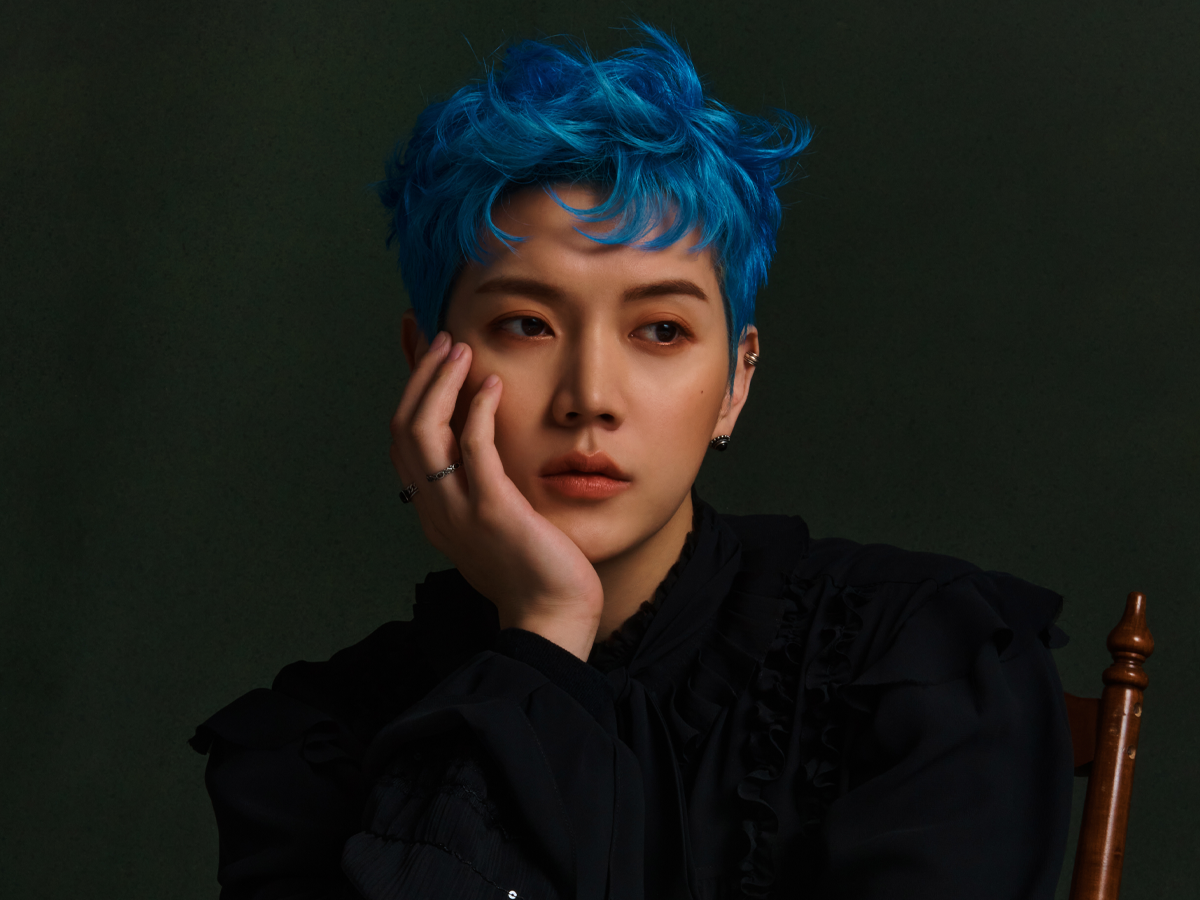
-
 ©️ SHOWNOTE
©️ SHOWNOTE
1
For an unseasoned actor who’s just started his career, Hedwig and the Angry Inch is likely a very difficult and challenging work. That Hedwig is a transgender person facing a complex set of circumstances isn’t really an issue, though. The real difficulty comes from the need to move seamlessly back and forth between two conflicting languages: one that portrays the dramatic aspects of Hedwig’s life in depth, while at the same time regularly inserting the language of everyday conversation to bring themselves closer to the audience and give the impression of a character you could meet in the street. Embodying these seemingly contradictory objectives on stage—making oneself simultaneously foreign and familiar—is the challenge: allowing the audience to recognize Hedwig as an incredibly unique individual while at the same time feel a sense of kinship with someone just like themselves. There aren’t too many lines that must be delivered word for word. The actor who portrays Hedwig, however, must embody every line and express them in a language true to the character such that the audience sees one Hedwig who combines both the character who communicates casually with us and the one who tells her story in dramatic terms. It might seem like a beginner’s spirit is just what it would take to overcome all of this, but there’s a great number of lines in the script, and the actor’s attempts at metamorphosis must never be a detriment to the production. Although a dramatic framework is in place, it’s a play that requires actors to change their lines depending on the situation, or adjust the situation according to their needs, which makes for a character that requires an actor with a lot of experience—and is therefore a role that many actors covet. The actor’s aptitude is often put to the test as they must exercise perfect delivery as they fill in the gaps in the dialog with the life of their own character.
Of course, since the audience almost universally figures out what Hedwig is all about fairly quickly, things aren’t usually so strict. One of the reasons for Hedwig’s resounding success in Korea despite being so unconventional is that the actors have done an excellent job expressing their individuality and communicate liberally with audiences, many of whom welcome it in turn. In this way, Hedwig is a musical that was designed such that the main character, Hedwig, her band, the Angry Inch, and the members of the audience all influence one another, but that doesn’t make it any easier to take on the challenging leading role.
Outside of these difficulties inherent to the skill of acting itself, the fact that a currently working idol is playing Hedwig brings forward again an issue we haven’t yet touched upon. The taboo nature of the subject matter means there are some things that could place something of a burden on an idol. Even taking into account that everything Hedwig does is a defiant act in which the minority, striving to survive, is trying to lay bare their existence and keep from being erased, certain aspects—the frank descriptions of the scenes flowing out of her mouth (which may require some censorship), the undisguised alienness, the profanity that punctuates the end of everything she says, her unfriendly attitude—make it so that to be Hedwig is to play a role that is in direct opposition to the image an idol (a literal object of worship) should maintain, and it’s here that a problem can arise. To hold tight to the identity as an idol risks failing to immerse oneself in another role and falling short as an actor; to embrace fully one’s character, as an actor must, risks damaging that idol image.
2
What kind of portrayal of Hedwig does REN from NU’EST give in Hedwig and the Angry Inch? REN’s Hedwig is one who never ceases exploring the world, never lets go of the desire to be loved, and still has the soul of a child. As the audience watches Hedwig pour her guts outs entirely in her own words through a poem entitled “The Road” and wonder just what kind of character this Hedwig is, they meet a young Hansel who puts her head in the oven and cheerfully sings, basking in the totality of that tiny world. Though she doesn’t realize it herself, the audience can be certain from the beginning of the performance that half of Hansel’s soul is music and that she’s already complete in that moment when she becomes one with it.
And so it seems like this Hedwig has never been the Other to anyone. She simply wants to skip over the callous hatred that past Hedwigs suffered through—the world’s prejudice and the sense of foreignness—and live for herself and just be. There’s hardly any sense of combativeness or self-pity for being a survivor; she seems to say, “I make you uncomfortable, don’t I? But I can’t stop being me. I’ll make sure you know I exist here.” She may be introduced with the words, “Ladies and gentlemen, whether you like it or not: Hedwig,” but she’s still fully confident that people will end up loving her in the end. That’s not, it would seem, for a lack of discrimination, nor because she’s particularly cordial with them. Rather, this Hedwig has no intention of becoming a victim and focuses instead on the love she receives.
The character Tommy, completely captivated after listening to one of Hedwig’s songs, talks about Adam, Eve and the fruit of the tree of the knowledge of good and evil, and then asks Hedwig for the fruit: “Tell me everything you know about good and evil. I want to know everything.” Within the Hedwig world, REN looks just like Tommy, asking for the forbidden fruit. The way Tommy’s voice drifts in from different venues in the distance during Hedwig’s own performances seems to reflect the actor’s real attitude and voice, sounding at once playful but familiar and natural. Hedwig sees Tommy as the bad guy but also someone she sincerely yearned for and, as such, wanted to stay with forever. At this point in the story, REN is already accepting of, learning from, and loving toward Hedwig. Hedwig also needs Tommy to sing “Wicked Little Town (Reprise)” for her. Make no mistake that REN believes Hedwig is perfect right from the outset. His Hedwig is in Tommy’s voice—one which REN portrays to the audience through Tommy’s voice and eventually gets through to Hedwig.
At their core, popular artists are people who need to be seen by others and the Other, and their job requires them to constantly put up with being the Other themselves. Because they spend so much time behind a mask playing a part put on for the public, oftentimes there’s a comfortable misunderstanding that the actor is no different from the role they play. Sometimes they have to field ridiculous questions, like, “Who are you really?” or “Which character are you more like?” Hedwig recognizes and accepts the otherness that permeates his entire life, but his suffering that arises from being unable to consolidate the parts of himself fragmented by that othering metaphorically represents what dysphoria looks like. How is a popular artist to go about expressing the way Hedwig suffers—someone whose true nature is continuously denied by others, who can never figure out where they belong, and who drifts about not knowing what their life means? REN doesn’t try to overstate the tragedy here; instead, he expresses the ego using his own strengths and approach.
3
It makes me wonder what kind of production Hedwig is to someone like REN who loves being in costume and makeup. As Hedwig herself says, her wig and makeup can be contextualized and interpreted as symbols in many different ways, both actively and passively. The story the performance tells on any given day is the story for that day only. For the remainder of the shows, REN will broaden himself through Hedwig, and a never-before-seen side of Hedwig’s story will be revealed through REN’s take on her character. And that’s really how the young Hedwig keeps moving forward. How much Hedwig can REN give an audience who are there to see him? How familiar will the audience be with Hedwig before they leave the theater? Will they catch onto the fact that they’ve become Hedwig? How can Hedwig’s otherness reach the point of being the everyday? For an actor, a sense of achievement comes from the feeling that, even though the audience knows he’s playing a fictional character, no one really notices the mask—that the character really exists somewhere. Perhaps, for REN, the world of musicals is a different “wicked little town,” separate from the world of K-pop. I wonder what sort of voice REN, walking down the path that is Hedwig, will follow, and if perhaps he can cultivate a voice unique to him.
“RENdwig” goes through an impressive three-part transformation, from his long time as the somewhat unfamiliar Hedwig, to another long while as Tommy, and finally a whole new side of himself after the finale when he returns for the curtain call. REN’s return to the stage wearing the pristine face not of Hedwig, nor of Tommy, nor his usual idol self, but of a fledging actor during the curtain call as “Wig in a Box” plays will likely stick around in my mind for a long time after.
Unauthorized reproduction and distribution prohibited.
- NU’EST’s message of romance2021.04.20

- REN “L.O.Λ.E is the reason I live”2021.04.29


